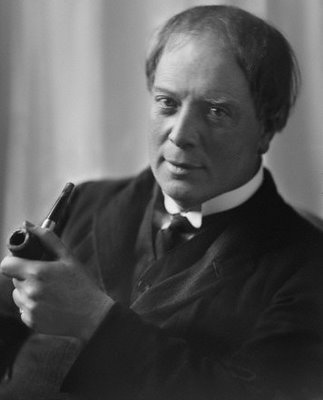 Arthur Machen (1863-1947)
Arthur Machen (1863-1947)
Arthur Machen's 1895 book The Three Impostors, or The Transmutations, is a delightfully strange read. It consists of a short frame narrative interspersed with six standalone stories told inside the frame. Spoilers and musings follow.
First the background to the events, which the reader learns only in the sixth and last story inside the frame. The learned Dr. Lipsius is the leader of a secret Dionysiac cult in 1890s London, focused on sex, drugs and ritual murder. He recruits the young scholar Joseph Walters into the cult. After helping lure a victim to the cult HQ, Walters loses his cool, steals a valuable Roman coin with Bacchic imagery and disappears into the streets. Lipsius sends his three most trusted cultists, two men and a woman, to find Walters and retrieve the coin. These are the titular impostors.
Here's where the book starts and the storyline turns from lurid to inexplicable. The frame narrative's main viewpoint characters are two young friends, both wannabe writers of independent means: Dyson and Phillipps. By chance, Dyson gets hold of the coin, a fact that the cultists never learn. Despite not knowing this, they for no apparent reason seek out Dyson (and in one case Phillipps) repeatedly under false identities and tell five really long and elaborate make-believe stories that form the bulk of the text. This means that most of this book is told by really unreliable narrators, and Dyson and Phillipps don't actually believe much of what they hear. Each of the stories features a character who looks exactly like the coin-thief: a young, nervous-looking man with spectacles and black whiskers. In the first story he stars as the leader of a Wild West outlaw gang. Then he appears as a supporting character in stories two, three and five: a school teacher, an assistant antiques scammer and a sinister private detective. But in the fourth story he doesn't feature at all.
The only reason I can see for the impostors to pay any attention to Dyson is that he unwittingly shares a literary acquaintance with the man the cultists are chasing. But the impostors' story-telling is so odd, long-winded and irrelevant that even Dyson and Phillipps find it ridiculous. When the bespectacled man is introduced again near the end of the fifth story, Dyson just snorts, stands up and leaves, and the female cultist/narrator breaks out into laughter. Finally the cultists place a watch on the aforementioned shared acquaintance, grab their quarry and kill him in a grisly fashion. Dyson happens to find poor doomed Walters' notebook and in it reads the sixth story that explains everything to the confused reader.
This is such a strangely plotted book – best seen as a short-story collection that has had a really contrived frame narrative bolted onto it. What makes it worthwhile is the high quality of the individual stories. Two of them exerted a huge influence on H.P. Lovecraft. He eagerly grabbed several details and at least two of Machen's main thematic preoccupations, that of sliding back down the evolutionary tree to a “lower” state of being and that of ancient evil cults surviving into the present day. But Lovecraft, a self-identified “mechanistic materialist”, certainly did not share Machen's hostility towards rationalist science that keeps being voiced by characters in the stories. Machen had seen the world become entzaubered, disenchanted, and he really wanted to re-enchant it.
The Three Impostors is highly recommended if you like feeling slightly lost and confused yet intrigued and amazed by what you read. It's available for free at Archive.org.
